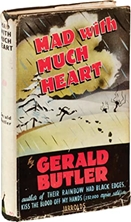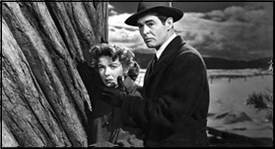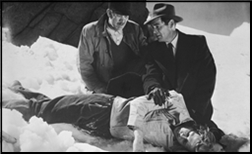Wed 30 Dec 2020
A Book! Movie!! Review by Dan Stumpf: GERALD BUTLER – Mad with Much Heart // ON DANGEROUS GROUND (1952).
Posted by Steve under Crime Films , Reviews[11] Comments
GERALD BUTLER – Mad with Much Heart. Rinehart & Co., hardcover, 1946. Originally published in the UK by Jarrolds, hardcover, 1945.
ON DANGEROUS GROUND. RKO, 1952. Robert Ryan, Ida Lupino, Ward Bond, Sumner Williams, Charles Kemper, Ed Begley, Ian Wolfe, Cleo Moore and Olive Carey. Screenplay by A.I. Bezzerides and Nicholas Ray. Directed by Nicholas Ray. Currently available for streaming on TCM.

I was much impressed with Butler’s first novel, Kiss the Blood Off My Hands, and While Mad with Much Heart isn’t quite as well-built, there’s still much to be glad of. It’s a terse chase story, set in the snow-bound English countryside, with Inspector James Wilson detailed from Scotland Yard to help the locals pursue a mad killer who has attacked two schoolgirls. As the story spins out, though, Wilson has less trouble with the killer than he has dealing with the vengeance-crazed father of one of the girls, with the killer’s blind sister, and with his own loneliness and self-doubt.
This isn’t really enough to carry a story successfully (asked for his opinion, Raymond Chandler advised against filming it), but Butler does a very nice job conveying the physical effort of running and driving through deep snow, the slippery suspense of a slow-motion car-chase over icy country lanes, and the sheer exhaustion of mind and body brought on by the cold. Somehow the visceral quality of the story and his prose keeps one turning the pages.

The film that John Houseman and Nicholas Ray made out of this despite Chandler’s advice is an oddly moving affair, rather disjointed (like many RKO films under Howard Hughes’ regime) and all the better for it. It opens with twenty minutes of sheer Big City noir, with Robert Ryan as a psychotic cop on the verge of murder, then shifts neatly to the snowbound countryside, where Ryan sees his own violence mirrored in the rampaging father (a fine performance by Ward Bond) setting up one of those narrative metaphors that Ray did so well: If Ryan can keep the berserk parent from blasting the frightened fugitive, then maybe (?) he can control his own sickness.

This is the sort of film on which Nicholas Ray built his reputation. The early city-set scenes are purest noir, with George E. Diskant’s camera sliding fluidly through seedy bars, sleazy apartment houses, and shadowy alleys, punctuated by short bursts of jerky hand-held shots to accentuate the violence. And when we move out into the country, Ray and Diskant impart the feel of icy snowscapes, jagged rocks, and rustic farms just as vividly.
Then there’s the plu-perfect playing, from the sleazy bit players, to Robert Ryan at the edge of violence, Ward Bond well over the top, charging through a landscape that barely holds him, and in the midst of this Ida Lupino serenely dominating the screen, while Sumner Williams as her disturbed brother darts about like some dangerously wounded animal.
In short, this is a totally unique film, done with consummate artistry, and if you’ve been a good little boy-or-girl this year, you owe yourself a viewing.
December 30th, 2020 at 8:37 pm
This was the film that convinced me Ryan ought to play Mike Hammer.
Aside from that as stated here the almost claustrophobic Noir opening and the dizzying agoraphobic snowbound exteriors mirror the characters flaws and conflicts in visual poetry.
In fact the film has an almost dreamlike quality that I saw repeated in Letterier’s UN ROI SANS DIVERTISEMENT, another snow bound hunt by a policeman driven to the edge by the vastness of the outdoors and his own demons.
December 30th, 2020 at 9:52 pm
Ryan had a fine career but I always thought he should have been a star of the Clark Gable magnitude.
December 30th, 2020 at 10:01 pm
If he could have been, Steve, he would have been.
December 30th, 2020 at 11:42 pm
Me, I don’t imagine that Clark Gable would ever have taken some of the edgy ..downright spooky …seriously menacing roles which Ryan made great. Ryan is like the anti-Gable. Gable’s evil twin.
As for this particular film: tragically I only ever saw the first 1/3 and I’m waiting to catch the rest of it someday. It’s pretty nifty when Ryan finds someone even more bloodthirsty than he is; well-handled story point.
December 30th, 2020 at 11:52 pm
Of course, he did, check out Night Nurse, or A Free Soul, and other gangster parts, Gable was discovered by the public. Jack Warner did not want him, and Metro though, at least initially, they had a tall James Cagney. As Barbara Stanwyck commented re Night Nurse, and she was the star, the film played d, did well enough then all of a sudden theatres were rebooking it. The only thing that made sense the public could not get enough of him.
Now, Gable and Tracy, teamed up in three films, started onstage playing the same part; Killer Mears in The Last Mile. Tracy in New York, Gable in California, and both were signed to keep playing the part, or variations of it. Gable was particularly effective as a good guy gangster in Manhattan Melodrama. Ryan could never have carried that off. As I said above, if he could, he would have.
December 31st, 2020 at 11:50 am
Good argument. I’ll defer to it.
I’m probably just thinking of some bit of Gable-trivia stuck in the back of my head: was it “Run Silent, Run Deep” where his character was supposed to …get injured or fail in some way …maybe get knocked-out-cold by Lancaster? But Gable didn’t feel it reflected well on the Gable screen persona…so he used his power to alter the script so that his character would merely be taken ill instead. Something like that. I can’t find it on IMDb just now so I don’t know where I ran across this.
I do remember the anecdote which took place on the set of ‘Call of the Wild’ where the director (much smaller than Gable) made him back down by threatening to mark his face if he didn’t start behaving himself. Always relished that little tidbit.
December 31st, 2020 at 12:52 pm
Certainly not knocked out cold by Lancaster; the scene had Burt taking over the ship by force for a declining Gable; that was restructured by having Lancaster take over for an injured Gable. Not at all the same. Oh, and as far as the auteur theory goes, and I am Not an Auterist, the most important person in the production, star or director, not the writer unless a hyphenate, gets to say. For example, another Gable incident:
This comes from Luther Davis screenwriter of The Hucksters. In the original novel, Gable’s character bullies a Hollywood agent, and ultimately uses the man Jewish religion against him. Three days prior to shooting that scene Clark went to Jack Conway, the director and said he would not play it, and suggest the writer come down to the set at once. Luther did, and Gable said, more or less the following.
‘They (the public) will see the picture and think Gable is an anti-Semite, well — I am not,and with the war, and everything (the Holocaust) I just won’t play it. Find another way to make the scene work.”
Luther turned the character into an ex-convict and he quoted Gable on this:
“The first way was better dramatically, but I’ll play this.’
Back to Run Silent Run Deep, Hecht and Lancaster needed Gable, they were in debt to the studio for all the well-meant socially pretentious production failures they had mounted.
December 31st, 2020 at 6:45 pm
This is a very good review of ON DANGEROUS GROUND. I agree that it is a major movie.
Robert Ryan made a lot of fine films. Especially in the 1947-1956 era when his theatrical film career was at its peak.
Also want to thank David for telling about Leterrier’s UN ROI SANS DIVERTISSEMENT. This is a film I’d never heard of. Sounds very interesting. Have seen Leterrier as actor is the terrific A MAN ESCAPED.
December 31st, 2020 at 8:48 pm
I thoroughly savor that movie ‘The Hucksters’. Glad to see it mentioned; always glad to hear more about it. Adolph Menjou, Ava Gardner, Sidney Greenstreet, Keenan Wynne, and Clark Gable? Oh and Kerr as well. What more can one ask. It’s a fascinating flick; yea there are some slow parts but its a fave of mine for its depiction of corporate America.
As for Gable: I’m better off talking about radio. But even from the better-stated version of the submarine anecdote (thank you for correcting my memory on that one) and the Hucksters anecdote as well, my impression remains that Gable was a star who was consciously ‘careful of’ his earning power and ‘careful of’ his status; whereas Ryan was a guy who would take an edgy and unsavory role like we see in ‘Crossfire’. I’m simply suggesting that Ryan could well have stepped into Gable’s career if given the opportunities; but that the opposite seems “unlikelier”. Gable seemed (to me) always too shrewd to let anything taint his star trajectory once he got a hold of it.
But I hasten to point out that this is merely my outsider’s opinion. It’s flimsy, and it’s entirely my own conjecture. I bow to everyone here who clearly hath more movie-lore at their command than I have.
‘Auteur theory’ is a horse of another color from anything said so far; I might contribute a few small shoots to such a topic if it sprouts, but I basically agree that the writer is not in power once the crank turns. A good script is essential but once production begins, the beast takes on life of its own. The big egos rule. As the old saying goes: never sleep with the writer!
December 31st, 2020 at 9:13 pm
Fine as he was Ryan, even as a leading man, was a character actor. I do think he could have been bigger with the right film, but he would never have been the kind of leading man a Gable or Lancaster were. He missed whatever it was that makes the camera love leading man and the audience not be able to look away.
You only need to see him on screen with Gable or Tracy to get the difference. The thing is that none of his good guy roles save this one were ever as compelling as his villains, and even here he plays half the film as a bad guy. His best lad roles, here and in THE SET UP are still character parts.
January 2nd, 2021 at 8:11 am
A good review of a movie I thought I remembered well but do not. I do not even remember Ward Bond. Might very well take your advice and watch it soon.